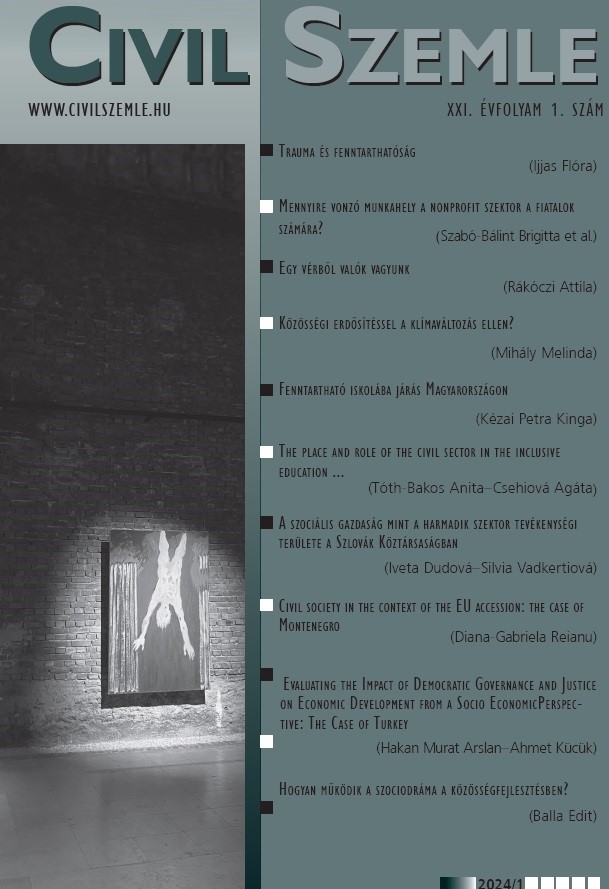How does sociodrama work in community development?
Abstract
Let’s meet and do it together! – This is how Jacob Levy Moreno, the father of sociometry, summarises the criteria which frame human communities work. But what happens when people who are strangers meet for the first time and begin doing something together? What is the change that can only be borne out of these situations; what level and depth of togetherness and joint activity is necessary for the miracle of group surplus to occur? What comes into play? Is there a common, working formula basic to human encounters, to being together? Because if there is, community development and group work practitioners, leaders, facilitators, can presumably all apply it in settings where they work with people who do not know each other or know each other superficially. In community work, where support is needed to establish the community’s agency, the professional’s confidence in initiating the process is largely dependent on his or her knowledge of what works. Over the last hundred years, social psychologists have developed a range of theories to explain what conditions determine people’s social behaviour and how these, in turn, inform personality development. Moreno’s pioneering theories in the fields of group dynamics and sociometry, „the science of measuring human relationships” are instrumental to the therapeutic practice of both psychodrama and sociodrama. My study focuses on a community development project that applied the action-oriented method sociodrama to work through a conflict in a housing estate. Using this example, I look to answer the question what makes sociodrama - and all other action-focused, encounter and collective activitybased methods - effective in community-based development and conflict resolution. I will also show whether the initiative can be as successful when established from above as when it is organically evolved, that is on the initiative of community members. group surplus, action-focused method.
References
Allport, Gordon W. (2014): Az előítélet. Budapest, Osiris Kiadó.
Blaskó Ágnes – Durst Móni – Fóti Orsolya – Galgóczi Krisztina – Horváth Kata – Kocsi Andrea – Pados Eszter (2021): A szociodráma folyamata. In: Blaskó Ágnes – Durst Móni – Fóti Orsolya – Galgóczi Krisztina – Horváth Kata – Kocsi Andrea – Pados Eszter: Táguló realitás. A szociodráma módszere. Budapest, L’Harmattan.
Blaskó Ágnes–Pados Eszter (2019): „A Mérei-féle csoportcentrikus pszichodráma mint szociodráma. Metszetek, 8., https://metszetek.unideb.hu/cikk/m%C3%A9rei-f%C3%A9le-csoportcentrikus-pszichodr% C3%A1ma-mint-szociodr%C3%A1ma Letöltve: 2023. 12. 15. https://doi.org/10.18392/metsz/2019/1/4
Csepeli György (2001): A szociálpszichológia vázlata. Budapest, Jószöveg Műhely Kiadó.
Horváth Kata (2021): Szociodráma – a morenói dráma társadalomképe. In: Blaskó Ágnes – Durst Móni – Fóti Orsolya – Galgóczi Krisztina – Horváth Kata – Kocsi Andrea – Pados Eszter: Táguló realitás. A szociodráma módszere. Budapest, L’Harmattan.
Mérei Ferenc (1989): Társ és csoport. Budapest, Akadémiai Kiadó.
Mérei Ferenc (1996): Közösségek rejtett hálózata. Budapest, Osiris Kiadó.
Merton, Robert K. (2002): Társadalomelmélet és társadalmi struktúra. Budapest, Osiris Kiadó.
Moreno, J.L. – Moreno, Z. (1980): Szociometria és mikroszociológia. In: Pataki Ferenc (szerk.): Csoportlélektan. Budapest, Akadémiai Kiadó.
Moreno, J. L. (2021): Szociodráma. In: Blaskó – Durst – Fóti – Galgóczi – Horváth – Kocsi – Pados: Táguló realitás. A szociodráma módszere. Budapest, L’Harmattan.
Moreno, Zerka T. –Blomkvist, Leif Dag – Rützel, Thomas (2006): „Pszichodráma – az élet duplája”. Beszélgetések Zerka Morenóval. Budapest, Animula Kiadó.
Tóth Balázs – Csányi Vilmos (2017): Hiedelmeink. Budapest, Libri.



